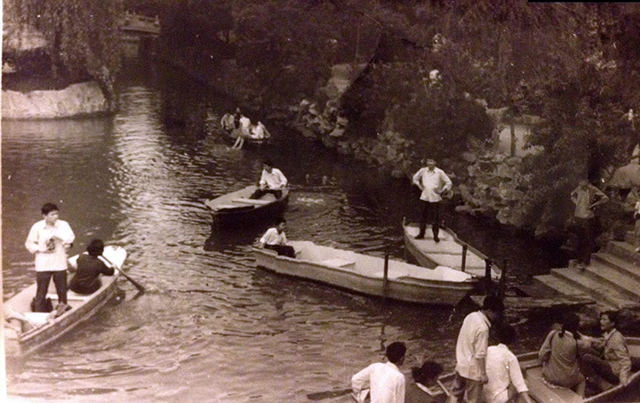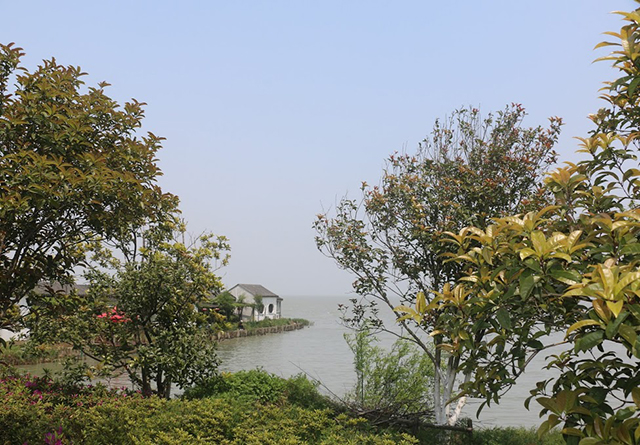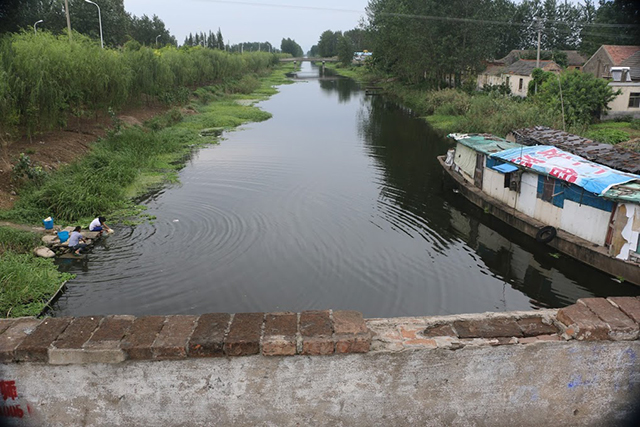Villagers dug this canal in northern Jiangsu during the Cultural Revolution.
By George Gao
I don’t think I’d ever seen a man in love until I saw a picture of my father from 1991. He was sitting alone in front of a typewriter in his new studio in the Bronx; the only decoration was a picture of my mother and me taped to the wall—she and I were still back in Suzhou. My father must have mailed this self-portrait overseas, because I found it two decades later as I was digging through old photo albums in my grandfather’s bedroom.
Sometimes I get nostalgic for my parents’ youth, mostly because they lived such a different life in China than the life we later shared in the US. Part of their narrative starts at Tai Hu (太湖), one of China’s largest and most fabled freshwater lakes. My parents went there on a date before I was born, and so on my last trip to Suzhou I insisted on visiting.
We passed Tiger Hill and the industrial park on the way there through newly built highways and miles of clogged streets. Tai Hu is a natural sanctuary on the outskirts of a bustling city; standing on the foothills of the East Mountain, I enjoyed how its waters met the sky. Though the lake today is riddled with industrial pollution, there are still many spots where the scenery is as sublime as a Tang Dynasty landscape painting.
I can only share what I see: the dusty alleyways, the manicured gardens, the old bridges, the creeks that wind their way through the city, the construction cranes, the markets, and the neon lights after dark.
I was born in Suzhou, though I left at the age of three. Despite my cultural and linguistic ties, I still have trouble describing the place to friends back home in the US. Most times, I can only share what I see: the dusty alleyways, the manicured gardens, the old bridges, the creeks that wind their way through the city, the construction cranes, the markets, and the neon lights after dark.
The challenges of describing my family’s history and ancestral home have changed with time. When I was younger, I didn’t have the vocabulary to convey my experiences in China. As I got older, I struggled instead with the idea that anything I write, any stories I tell, may attract the attention of government censors.
Politics aren’t discussed in my family, nor are they discussed very openly inside China as a whole. Modern history is well curated, often boiled down to museum-like placards. Though my blood relatives lived through the grit of China’s volatile twentieth century, it has always been taboo for them, and for everyone else, to discuss it openly. It’s as if China’s economic transformation today requires a certain degree of political and historical amnesia to continue. For me to learn about my family’s world requires sifting through webs of censorship.
Yet I can hardly blame people there for focusing on economics rather than politics. Many conversations I hear revolve around the daily hustle: Do you have enough to eat? What’s the fastest bus route? How will you carry your belongings? How is your health and your family?
While China’s wealth has skyrocketed since the end of Mao Zedong’s reign—with GDP per capita increasing sixteen-fold from 1980 to 2013—its inequality also has risen at a dizzying rate. I thought about this disparity after I hopped on a sleeper train at Suzhou station headed for Shanghai. My leg of the journey would only take an hour, but many of the other passengers, who couldn’t afford plane tickets, had been there all night—from when the train’s route began in Chengdu, more than 1,200 miles away. They were huddled masses: taking turns with family members to rest on the few available chairs, hugging their possessions against them, and trying to fall sleep. It was strange to think about how many people traveling on that train were old enough to have lived through China’s wars, rebellions, and revolutions.
My father told me that this train hadn’t changed much over the years: when he was my age, he and his friends had to take turns sleeping on the floor underneath the seats when they went on vacation to Beijing.
My grandfather tussled his way through the crowd and managed to find somewhere to sit. He looked up at my father and me with a victorious grin as we elbowed the passengers standing beside us out of the way. My father told me that this train hadn’t changed much over the years: when he was my age, he and his friends had to take turns sleeping on the floor underneath the seats when they went on vacation to Beijing.
Perhaps the most significant era in modern Chinese history that my family lived through was the Cultural Revolution (1966-1976). That’s when Mao fostered a spirit of ongoing creative destruction, according to John Delury and Orville Schell in their 2013 book Wealth and Power. The revolution destroyed historical works and artifacts and uprooted age-old traditions. The “Red Guards” (红卫兵)—Mao’s political militias—patrolled the streets, attacking scholars and intellectuals. Some were caught up in such frenzies that they turned against their own relatives and teachers—shocking acts in a society that had long valued filial piety and the sacredness of education. For the average citizen, it was a decade of constant insecurity.
My parents grew up against the backdrop of the Cultural Revolution, while my grandparents toiled through the uncertainty and reform-through-labor that characterized the movement. My mother’s family was sent from Suzhou, where my grandparents worked as teachers, to a rural village in northern Jiangsu near Yan Cheng. In the countryside—down the street from where huge textile factories now stand—they dug canals and grew crops.
I went with my mother to visit her old village, almost forty years after she left. It was summer, and the sun beat down over the treeless fields. Physically, the village hadn’t changed much. It had the same paths that led to the same shops and schoolrooms as when she was there. The same creeks wound through the same dozen or so homes. Even her neighbors were the same, just older, with children who grew up and moved out like my mother did.
It’s funny to see how people who were once close receive each other after decades of being apart. Each assumes the other hasn’t changed, and conversations revert to what they were like back then. “You got married?” the neighbors said to my mother in disbelief. “You moved to America? This is your son?” I was amazed how different my upbringing in New Jersey’s suburbs was from my mother’s in China, just one generation apart.
For my mother, it was all too natural to slip from one town in New Jersey—filled with Boy Scouts and their Lexus-driving soccer moms—to another, where villagers stored their own coffins in the kitchen.
They also asked about my father. “He’s a doctor from Suzhou? Is he a good man?” said one woman with familial concern. “Yes, Suzhou… men from Suzhou are good people,” a man said to her reassuringly.
For my mother, it was all too natural to slip from one town in New Jersey—filled with Boy Scouts and their Lexus-driving soccer moms—to another, where villagers stored their own coffins in the kitchen. For me, I saw the village through a smokescreen. With all I’ve read about China in the 1970s, I wondered: What happened here? Has there been little drama since then? Days are long and monotonous in the cornfields, and it was as if time there just slipped away—one week becomes another, one year melts into the next. I wanted to understand so much more about the revolution and about rural life, but all I could see were its ghosts: the canal my uncle and grandfather dug, the remains of the one-room schoolhouse, the now polluted creek where children once swam. My mother pointed those places out to me with some nostalgia.
The stasis in the villages also stood in stark contrast to the growth and transformation of China’s cities. Evan Osnos writes in Age of Ambition (2014) that in the 2000s, China was building the square-foot equivalent of Rome every two weeks. By 2012, the country’s population was more urban than rural for the first time.
My mother was part of the earlier phases of this migration. She returned to the city shortly after Mao’s death and tested into medical school. After graduating four years later, she met my father while working at a hospital in Suzhou, where my father also worked as an eye surgeon. They got married in 1988 and moved into my paternal grandparents house, where I was born the following year.
My grandfather has a cabinet in his house filled with Mao-era relics: hats, uniforms, badges, worn-out red books. I once stood in front of a whole row of red books at a museum in Xi’an with a Chinese tour group. One man said, “Back in the day, I could recite passages from this book.” Another said, “Me too, but I could recite the whole book.”
I asked my grandfather, a retired engineer who translates poetry in his spare time, what he thought about Mao’s verses. “He’s a good writer,” he said, and I couldn’t get much more than that; the conversation turned toward Marxist and Leninist political theory. “It was a different time,” he added, without elaboration. To me, the objects in his cabinet sit without context, like dots in an unfinished pointillist painting. The human stories and the big picture remain absent.
I was four months old when Tiananmen Square erupted, during a summer when the big cities, and especially Beijing, were hotbeds of political protest. My grandfather was in Beijing for an engineering conference at the time. After the conference, he went to visit his brother-in-law’s house, bringing food and wine from Suzhou—a city known for its delicacies. Those were the days before high-speed railways and cell phones, when traveling long distances was always a great ordeal.
My great-uncle, after receiving my grandfather, recommended that he get out of town as soon as he could. It was early afternoon on June 3, hours before the bloodshed would begin; there was already tension in the air. My grandfather caught a bus to the train station, but traffic was backed up, so he decided to walk the rest of the way. He found himself walking alongside the Square, and he couldn’t make it much further.
“I saw them, the students all lined up,” he told me, twenty-six years later as we were sipping tea. Night fell, so my grandfather got a room in a nearby hotel. He was washing his face and preparing for bed when he heard gunshots outside the window.
My family was never a political family; we were mostly scientists and doctors. At most, we were thoughtful observers of politics in action. If that event in any way affected my father’s decision to move to America, he’d never admit it. Nonetheless, my father picked up everything and left the country a year later, just like that, as if his life were as light as a feather.
My father was among the first in his family to leave the Middle Kingdom for better opportunities abroad. My mother and I would follow him to the US a year later. Every time I leave China after a visit, my grandparents and my aunts and uncles all see me off at the bus station. Every time I wave goodbye to them as the bus pulls away toward the airport, I’m reminded that this was what my father must have felt when he left for America twenty-five years ago.
My parents took many pictures of Tai Hu before I was born, in a time before any paved roads connected the lake to the city. The journey through the dirt pathways took over six hours by bicycle. The landscape by the lake, though, is mostly unchanged—the water remains serene.
My father doesn’t recognize much of Suzhou anymore, even though he spent the first thirty years of his life there. Sometimes he’d see an old alleyway or house, and he’d point out that his classmate used to live there, and he’d wonder if the classmate was still there. On the way back from Tai Hu, we drove past a small clearing in the woods, and something clicked inside him. “That’s the farm where I picked fruit for two months in middle school,” he told me, as the setting brought back the memory—perhaps for the first time in decades. “That’s what you had to do back then,” he said, referring to his upbringing during the Cultural Revolution. It was rare for him to reminisce. He was always clear-eyed about the future and never one to get caught up in the past.
“I remember that summer,” said my uncle, who stayed in Suzhou after my father left. We were still in the countryside on the outskirts of the city, and my uncle was driving. “That’s the hotel where Jiang Zemin used to stay when he visited,” my uncle said, pointing to a palatial building tucked away in the woods, a piece of local trivia. Soon, though, the green mountains and gray lake-water disappeared. We were back on the highway, hurdling past countless rows of newly built high-rises. Before I knew it, we were downtown again, where traffic was snarled, and the sounds of commerce filled the air.


